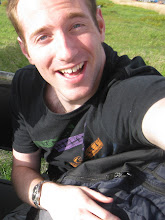“If you’re going in the opposite direction, you really don’t have to give me a ride.”
“No, I insist!” he said. “I have lots of time. Do you know the word, nonbiri? It means living the slow life.”
“Nonbiri – the slow life – I like that!”
So Uchida-san threw his Suzuki into gear and pulled a u-turn; we headed West. The area is famous for its delicious deer burgers so I asked if we could stop to try one. We each had one from “Cowberry.” a roadside service centre restaurant. Sometimes the slow life involves fast food.
Uchida-san proved to be excellent company and the winding mountain roads afforded spectacular views.
Taking our time exploring picturesque vistas and highway service stations, we eventually arrived in Abashiri, my destination for the day. I thanked Uchida-san with a piece of Native-Canadian art I’d picked up at a little Canadian specialty shop in Tokyo. (Imported is still authentic, right?) He bowed, got back in his Suzuki, and headed back the way we’d come.
I heard that word, nonbiri, from many Hokkaidans on the trip. The island bears a stark contrast to Tokyo, whose residents work too much, sleep too little, and don’t have much time to really enjoy life.
Everyone together now, take a breath.
In …………
Out ………
Nonbiri.








